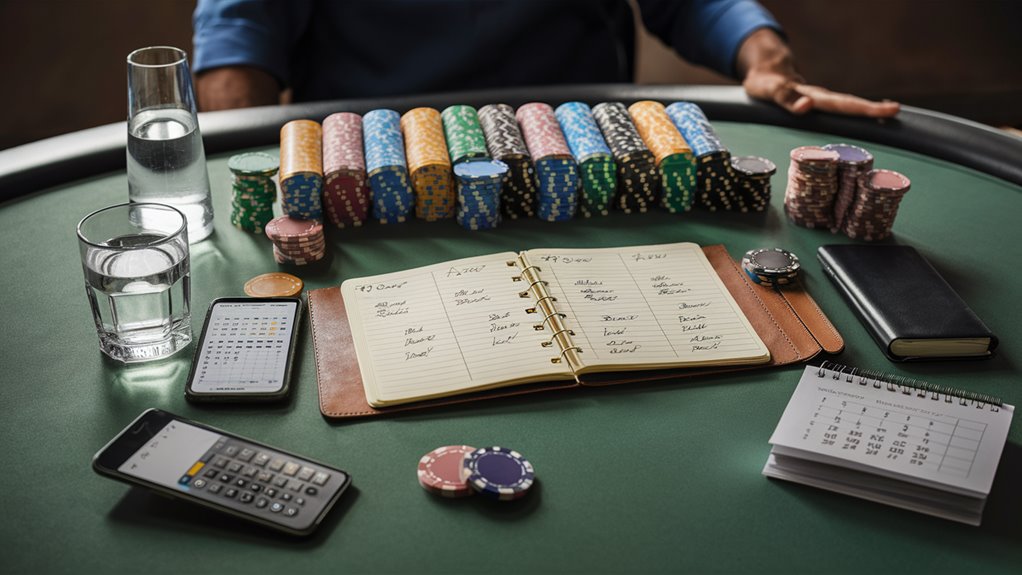Start Playing Poker: How to Keep Your Money Safe for Beginners

Key Tips on Money Management
Smart money handling is at the bottom of all good poker play. Keep at least 30 buy-ins for the game level you pick – often $4,000-$6,000 for $1/$2 No-Limit games. This safety net helps with ups and downs and keeps you in the game longer.
Savvy Table Choice
Good table choice can make or break your gains. Stay away from tables with expert tight players and pick ones with lots of bets on the flop. Look for easy games and rooms with loose play to make the most of your edge.
Recording and Analyzing Results
Keep a full log of your poker games, including:
- Buy-in amounts
- Cash-out totals
- Main stats (VPIP, PFR)
- Win/loss trends
- Playing time
Getting Better at the Mental Game
Being cool-headed makes winners. Do:
- Practice meditation often
- Set firm stop-loss limits
- Keep clear decision rules
- Stop tilt before it stops you
Basic Poker Skills
Know these key skills:
- How to use your position
- How to tell pot odds
- How to think about hand ranges
- How to read hands
- How to size your bets right
Winning at poker means sticking to these rules and keeping a tight grip on your money. Focus on slow, steady learning and being sharp with the basics.
Basic Poker Terms: A Full Guide
Poker Position Basics
Position is a key play point in poker, telling where you sit next to the dealer button. This core idea affects all you do at the table, as your spot sets when you bet in the rounds. Playing from a later spot can give big benefits, letting you see what others do before you decide.
Understanding Pot Odds
Pot odds use math to guide good poker play. This ratio of the pot size to what you need to call tells if staying in play is a good bet by the numbers. Knowing pot odds helps players make choices that make money, guided by hard math over just gut feel.
Looking at Player Ranges
The term range covers all hands your foe might have. Sharp players always think about ranges by looking at bet moves, spots, and how players act. Range thinking aids good guesses and guides smart choices all through a hand.
Figuring Out Equity
Equity is your math shot at winning at any point of a hand. This % needs you to know your cards and guess your foes’ possible hands. Right equity guesses help you make money moves in tricky poker spots.
Using Implied Odds
Implied odds go past simple pot odds by adding likely future bets. This high-skill idea is key when playing hands with big possible ups. Getting implied odds lets players make smart calls even if the now odds look bad, making more money over time.
Set Your Money Limits: A Pro Guide

Money Management Rules
Smart money management is a main part of long-term poker wins. Clear limits keep your cash safe and open chances for smart play growth Cresting Reels to Regal Bonus Treasures
Picking Your Starting Money
The best start calls for 20-30 buy-ins for your game level. For $1/$2 No-Limit Hold’em games with a $200 top buy-in, have a $4,000-$6,000 bankroll. This cushion helps with ups and downs while letting your skills grow.
Adjusting Based on What You Know
Risk feel and win speed shape how much money you need:
- New players: Keep 30 buy-ins at least
- Pros: May go with 20 buy-ins
- Lowest line: Never go under 20 buy-ins
Smart Stake Moves
Guidelines for moving your money:
- Drop down when you hit 75% of your start goal
- Go up only after you get 120% of the needed stakes
- Stay calm to keep bad calls at bay
This plan keeps your play steady, making the most money over time while keeping risks low.
Right Poker Game Picking: A Smart Guide
Choices in Game Types
Picking games is a key skill that sets top poker players apart. The first choice is between cash games and tournaments, as each type needs different play methods and money handling.
Cash Game Picking Plan
When going for money-making cash games, play at levels letting a minimum buy-in of 50 times the big blind. Look for these signs:
- Big average pots
- Lots of flop bets
- Easy players around
- Loose play overall
Steer clear of rooms full of tough tight players, as they cut down what you can make.
Tournament Picking Basics
For the best tournament picks, look for:
- Games with slow blind raises
- Player counts between 100-300
- 이 내용을 꼭 확인해보세요
- Multi-table setups over single-table ones
- Weekend games with casual players
Watching Wins and Where You Stand
Keep a close eye on wins. Follow a tight plan when moving up stakes. Keeping a cool head helps avoid costly errors. Picking money-making games needs you to think past pride in your choices.


